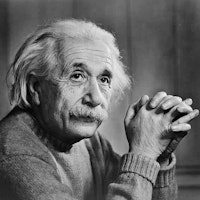Confucius, Buddha, Jesus and Gandhi have done more for humanity than science has done.
Albert Einstein

Values of Conscience
Topic: Interfaith Pathways
As man becomes conscious of the stupendous laws that govern the universe in perfect harmony, he begins to realize how small he is. He sees the pettiness of human existence, with its ambitions and intrigues, its ‘I am better than thou’ creed. This is the beginning of cosmic religion within him; fellowship and human service become his moral code. Without such moral foundations, we are hopelessly doomed. If we want to improve the world we cannot do it with scientific knowledge but with ideals. Confucius, Buddha, Jesus and Gandhi have done more for humanity than science has done. We must begin with the heart of man—with his conscience—and the values of conscience can only be manifested by selfless service to mankind.
Albert Einstein, born on 14 March 1879 and passing away on 18 April 1955, stands as one of the most renowned theoretical physicists in history. Best known for his groundbreaking special and general theories of relativity, his scientific endeavors spanned a multitude of areas within the field of physics. Amongst his numerous accolades, he was awarded the Nobel Prize in physics for his elucidation of the photoelectric effect—a phenomenon that expanded the horizons of quantum theory.
Einstein's journey, however, wasn't merely defined by scientific discoveries, but by the myriad challenges he overcame across various dimensions of his life. In his spiritual journey, he grappled with the concepts of God and universe. Socially, he navigated the complexities of his time—facing the rise of anti-Semitism, experiencing exile from his homeland due to Nazi oppression, and advocating for civil rights, disarmament, and global peace. These adversities only strengthened his resolve and underscored his resilience.
Beyond his professional accomplishments, Einstein's life was enriched by a tapestry of relationships and dialogues with luminaries from diverse fields. He engaged in profound conversations on the nature of reality with the likes of the Indian poet Rabindranath Tagore, discussed the principles of non-violence with Mohandas Gandhi, and deliberated on humanitarian issues with Albert Schweitzer. Furthermore, his camaraderie with fellow scientists and physicists provided a fertile ground for intellectual exchanges, fostering an environment of collaboration and innovation during one of the most exciting epochs in scientific history.
Einstein and the Poet
Hermanns, William, and Albert Einstein. Einstein and the Poet: in Search of the Cosmic Man. Branden Press, 1983.

Albert Einstein
Theme: Interfaith Dialogue

About This Albert Einstein Quotation [Commentary]
Albert Einstein’s quotation, juxtaposing the impact of spiritual leaders like Confucius, Buddha, Jesus, and Gandhi against the backdrop of scientific achievements, opens a profound dialogue on the essence of human progress and the role of interfaith harmony. Einstein acknowledges the monumental achievements of science but posits that the true measure of humanity’s advancement lies not in technological or scientific breakthroughs but in the moral and spiritual development fostered by these luminary figures. Through their teachings, which cut across different cultures and epochs, they have laid down the moral codes and ethical paradigms that underpin human societies. Their contributions transcend mere intellectual or material progress, touching the core of human existence—our moral and spiritual well-being.
In the broader context provided by Einstein, he unveils his vision of a cosmic religion, one that harmonizes the laws governing the universe with the intrinsic moral compass within every human being. This perspective does not diminish the value of scientific inquiry; rather, it places it within a larger framework where spiritual understanding and scientific knowledge coexist. Einstein suggests that recognizing the “pettiness of human existence” amidst the universe’s vastness should lead to humility and a commitment to fellowship and service. Here, interfaith dialogue emerges as a critical tool for achieving this understanding, as it embodies the convergence of diverse spiritual paths towards a common goal of human service and moral excellence.
The essence of Einstein’s message encourages a reevaluation of the foundations upon which we build our future. It is not through the lens of superiority or through the solitary pursuit of scientific knowledge that humanity will thrive, but through the collective and selfless service to mankind, inspired by the teachings of great spiritual leaders. This call for a shift from ego-centric ambitions to a more heart-centered approach to living emphasizes the importance of conscience, compassion, and the universal values shared across different faiths. Interfaith dialogue, in this context, becomes a bridge that not only fosters mutual respect and understanding among different religious traditions but also serves as a testament to the interconnectedness of all human endeavors, spiritual and scientific alike.
Additional Quotes from Einstein and the Poet
Einstein and the Poet
Einstein and the Poet: In Search of the Cosmic Man came out of a series of meetings William Hermanns had with Albert Einstein in 1930, 1943, 1948, and 1954.
Related Quotes
Copyright © 2017 – 2026 LuminaryQuotes.com About Us